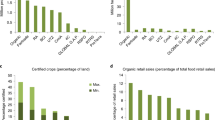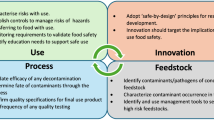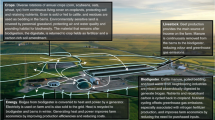Abstract
Sustainable agrifood systems are critical to averting climate-driven social and ecological disasters, overcoming the growth paradigm and redefining the interactions of humanity and nature in the twenty-first century. This Perspective describes an agenda and examples for comprehensive agrifood system redesign according to principles of sufficiency, regeneration, distribution, commons and care. This redesign should be supported by coordinated education and research efforts that do not simply replicate dominant discourses on food system sustainability but point towards a post-growth world in which agroecological life processes support healthy communities rather than serving as inputs for the relentless pursuit of economic growth.
This is a preview of subscription content, access via your institution
Access options
Access Nature and 54 other Nature Portfolio journals
Get Nature+, our best-value online-access subscription
$32.99 / 30 days
cancel any time
Subscribe to this journal
Receive 12 digital issues and online access to articles
$119.00 per year
only $9.92 per issue
Buy this article
- Purchase on SpringerLink
- Instant access to full article PDF
Prices may be subject to local taxes which are calculated during checkout
Similar content being viewed by others
References
Campbell, B. M. et al. Agriculture production as a major driver of the earth system exceeding planetary boundaries. Ecol. Soc. 22, 8 (2017).
Niles, D. in Oxford Handbook of Heritage Studies (eds Labrador, A. & Silberman, N.) 339–354 (Oxford Univ. Press, 2018).
Fedoroff, N. V. & Cohen, J. E. Plants and population: is there time? Proc. Natl Acad. Sci. USA 96, 5903–5907 (1999).
Springmann, M. et al. Options for keeping the food system within environmental limits. Nature 562, 519–524 (2018).
Haberl, H. et al. A systematic review of the evidence on decoupling of GDP, resource use and GHG emissions, part II: synthesizing the insights. Environ. Res. Lett. 15, 065003 (2020).
Canfield, M., Anderson, M. D. & McMichael, P. UN Food Systems Summit 2021: dismantling democracy and resetting corporate control of food systems. Front. Sustain. Food Syst. 5, 661552 (2021).
Willett, W. et al. Food in the Anthropocene: the EAT–Lancet Commission on healthy diets from sustainable food systems. Lancet 393, 447–492 (2019).
Clark, M. A. et al. Global food system emissions could preclude achieving the 1.5° and 2°C climate change targets. Science 370, 705–708 (2020).
Howard, P. H. Concentration and Power in the Food System: Who Controls What We Eat? (Bloomsbury, 2016).
Henders, S., Persson, U. M. & Kastner, T. Trading forests: land-use change and carbon emissions embodied in production and exports of forest-risk commodities. Environ. Res. Lett. 10, 125012 (2015).
Neo, H. & Emel, J. Geographies of Meat: Politics, Economy and Culture, Critical Food Studies Series (Taylor and Francis, 2017).
Nestle, M. Food Politics: How the Food Industry Influences Nutrition and Health (UC Press, 2004).
Another Perfect Storm? How the Failure to Reform Food Systems Has Allowed the War in Ukraine to Spark a Third Global Food Price Crisis in 15 Years, and What Can Be Done to Prevent the Next One (IPES-Food, 2022).
D’Alisa, G., Demaria, F. & Kallis, G. Degrowth: A Vocabulary for a New Era (Routledge, 2015).
Kothari, A., Salleh, A., Escobar, A., Demaria, F., & Acosta, A. Pluriverse: A Post-development Dictionary (Tulika Books, 2019).
Nelson, A. & Edwards, F. Food for Degrowth: Perspectives and Practices (Routledge, 2021).
O’Neill, D. W., Fanning, A. L., Lamb, W. F. & Steinberger, J. K. A good life for all within planetary boundaries. Nat. Sustain. 1, 88–95 (2018).
Fuchs, D. et al. Consumption Corridors: Living Well within Sustainable Limits (Routledge, 2021).
Latour, B. After Lockdown: A Metamorphosis (Polity, 2021).
Johns, T. & Sthapit, B. R. Biocultural diversity in the sustainability of developing-country food systems. Food Nutr. Bull. 25, 143–155 (2004).
Hickel, J., Dorninger, C., Wieland, H. & Suwandi, I. Imperialist appropriation in the world economy: drain from the global South through unequal exchange, 1990–2015. Glob. Environ. Change 73, 102467 (2022).
Gilbert, J. Indigenous Peoples’ Land Rights under International Law (Brill, 2016).
The Right to Produce and Access to Land: Position of the Vía Campesina on Food Sovereignty Presented at the World Food Summit, 13–17, November, Rome (Vía Campesina, 1996).
Cohen, M. J. The Future of Consumer Society: Prospects for Sustainability in the New Economy (Oxford Univ. Press, 2016).
Hess, C. & Ostrom, E. Understanding Knowledge as a Commons: From Theory to Practice (MIT, 2007).
Vivero-Pol, J. L. in Routledge Handbook of Food as a Commons (eds Vivero-Pol, J. L. et al.) Ch. 2 (Routledge, 2019).
Kallis, G. Limits: Why Malthus Was Wrong and Why Environmentalists Should Care (Stanford Briefs, 2019).
Harvey, D. in The New Imperialism (Oxford Univ. Press, 2003).
Bollier, D. & Helfrich, S. Patterns of Commoning (Commons Strategy Group and Off the Common Press, 2015).
Bornemann, B. & Weiland, S. New perspectives on food democracy. Polit. Gov. 7, 1–7 (2019).
Puig de la Bellacasa, M. Matters of Care—Speculative Ethics in a More Than Human World (Univ. of Minnesota Press, 2017).
Barca, S. Forces of Reproduction: Notes for a Counter-hegemonic Anthropocene (Cambridge Univ. Press, 2020).
Rupprecht, C. D. D. et al. Multispecies sustainability. Glob. Sustain. 3, e3 (2020).
Weber, H., Wiek, A. & Lang, D. J. Sustainability entrepreneurship to address large distances in international food supply. Bus. Strategy Dev. 3, 318–331 (2020).
Orr, D. W. Four challenges of sustainability. Conserv. Biol. 16, 1457–1460 (2002).
Chabay, I., Koch, L., Martinez, G. & Scholz, G. Influence of narratives of vision and identity on collective behavior change. Sustainability 11, 5680 (2019).
Gliessman, S. R. Agroecology: The Ecology of Sustainable Food Systems 3rd edn (CRC, 2015).
Ricciardi, V., Mehrabi, Z., Wittman, H., James, D. & Ramankutty, N. Higher yields and more biodiversity on smaller farms. Nat. Sustain. 4, 651–657 (2021).
McDougall, R., Kristiansen, P. & Rader, R. Small-scale urban agriculture results in high yields but requires judicious management of inputs to achieve sustainability. Proc. Natl Acad. Sci. USA 116, 129–134 (2019).
IPES-Food From Uniformity to Diversity: A Paradigm Shift from Industrial Agriculture to Diversified Agroecological Systems (International Panel of Experts on Sustainable Food Systems, 2016).
Ricciardi, V., Ramankutty, N., Mehrabi, Z., Jarvis, L. & Chookolingo, B. How much of the world’s food do smallholders produce? Glob. Food Sec. 17, 64–72 (2018).
Herrero, M. et al. Farming and the geography of nutrient production for human use: a transdisciplinary analysis. Lancet Planet. Health 1, e33–e42 (2017).
Desmarais, A. La Vía Campesina: Globalization and the Power of Peasants (Pluto, 2007).
Cato, M. S. The Bioregional Economy: Land, Liberty and the Pursuit of Happiness (Routledge, 2013).
Smaje, C. A Small Farm Future (Chelsea Green, 2020).
Niles, D. & Roff, R. Shifting agrifood systems: the contemporary geography of food and agriculture; an introduction. GeoJournal 73, 1–10 (2008).
Gibson-Graham, J. K. & Dombroski, K. The Handbook of Diverse Economies (Edward Elgar, 2020).
Shiomi, N., Katsuyama, K., Une, Y., & Sakakida, M. Han-Nou Han X: Kore Made Kore Kara (Han-Nou Han-X: Past and Future) (Soshinsha, 2021).
Calo, A. et al. Achieving food system resilience requires challenging dominant land property regimes. Front. Sustain. Food Syst. 5, 683544 (2021).
Schupp, J. L. & Sharp, J. S. Exploring the social bases of home gardening. Agric. Hum. Values 29, 93–105 (2012).
Gbedomon, R. C. et al. Functional diversity of home gardens and their agrobiodiversity conservation benefits in Benin, West Africa. J. Ethnobiol. Ethnomed. 13, 1–15 (2017).
Rabiela, T. R. in The Oxford Encyclopedia of Mesoamerican Cultures (ed. Carrasco, D.) 200–201 (Oxford Univ. Press, 2001).
Tajima, K. The marketing of urban human waste in the early modern Edo/Tokyo metropolitan area. Environ. Urbain/Urban Environ. 1, 1039 (2007).
Jehlička, P. & Daněk, P. Rendering the actually existing sharing economy visible: home‐grown food and the pleasure of sharing. Sociol. Ruralis 57, 274–296 (2017).
Kamiyama, C., Hashimoto, S., Kohsaka, R. & Saito, O. Non-market food provisioning services via homegardens and communal sharing in satoyama socio-ecological production landscapes on Japan’s Noto peninsula. Ecosyst. Serv. 17, 185–196 (2016).
Altieri, M. A. & Funes-Monzote, F. R. The paradox of Cuban agriculture. Monthly Review (1 January 2012).
Cederlöf, G. Low-carbon food supply: the ecological geography of Cuban urban agriculture and agroecological theory. Agric. Hum. Values 33, 771–784 (2016).
Gerber, J. F. Degrowth and critical agrarian studies. Peasant Stud. 47, 235–264 (2020).
Altieri, M. A. & Nicholls, C. I. Urban agroecology: designing biodiverse, productive and resilient city farms. AgroSur 46, 49–60 (2018).
Balázs, B. in Routledge Handbooks of Food as Commons (eds Vivero-Pol, J. L. et al.) 296–310 (Routledge, 2020).
Sardeshpande, M., Rupprecht, C. & Russo, A. Edible urban commons for resilient neighborhoods in light of the pandemic. Cities 109, 103031 (2021).
Colby, A. Subsistence Agriculture in the US: Reconnecting to Work, Nature and Community (Routledge, 2020).
Novkovic, S. & Webb, T. (eds) Cooperatives in a Post-growth Era: Creating Cooperative Economics (Zed Books, 2014).
Carvalho, B., Wiek, A. & Ness, B. Can B Corp certification anchor sustainability in SMEs? Corp. Soc. Responsib. Environ. Manage. 29, 293–304 (2022).
Taherzadeh, O., Bithell, M. & Richards, K. Water, energy and land insecurity in global supply chains. Glob. Environ. Change 67, 102158 (2021).
Shilling, H. J., Wiedmann, T. & Malik, A. Modern slavery footprints in global supply chains. J. Ind. Ecol. 25, 1518–1528 (2021).
Porkka, M., Kummu, M., Siebert, S. & Varis, O. From food insufficiency towards trade dependency: a historical analysis of global food availability. PLoS ONE 8, e82714 (2013).
Clapp, J. The trade-ification of the food sustainability agenda. Peasant Stud. 44, 335–353 (2017).
Weber, H. & Wiek, A. Cooperating with ‘open cards’—the role of small intermediary businesses in realizing sustainable international coffee supply. Front. Sustain. Food Syst. 5, 663716 (2021).
Friel, S., Schram, A. & Townsend, B. The nexus between international trade, food systems, malnutrition and climate change. Nat. Food 1, 51–58 (2020).
Jurgilevich, A. et al. Transition towards circular economy in the food system. Sustainability 8, 69 (2016).
Manor, O. et al. Health and disease markers correlate with gut microbiome composition across thousands of people. Nat. Commun. 11, 5206 (2020).
Koohafkan, P. & Altieri, M. A. Globally Important Agricultural Heritage Systems: A Legacy for the Future (FAO, 2011).
Admussen, N. Six proposals for the reform of literature in the age of climate change. Crit. Flame 42, May–June (2016).
Schiff, R. The role of food policy councils in developing sustainable food systems. J. Hunger Environ. Nutr. 3, 206–228 (2008).
Mangnus, A. C. et al. New pathways for governing food system transformations: a pluralistic practice-based futures approach using visioning, back-casting, and serious gaming. Ecol. Soc. 24, 2 (2019).
Godin, L. & Sahakian, M. Cutting through conflicting prescriptions: how guidelines inform ‘healthy and sustainable’ diets in Switzerland. Appetite 130, 123–133 (2018).
Walker, G. P. in Social Practices, Interventions, and Sustainability: Beyond Behavior Change (eds Strengers, Y. & Maller, C.) Ch. 3 (Routledge, 2015).
Guston, D. H. Understanding ‘anticipatory governance’. Soc. Stud. Sci. 44, 218–242 (2014).
McGreevy, S. R. et al. Learning about, playing with, and experimenting in critical futures through soft scenarios: directions for food policy. Kankyou Kagaku Kaishi (Environ. Sci.) 34, 46–65 (2021).
Mangnus, A. C., Oomen, J., Vervoort, J. M. & Hajer, M. A. Futures literacy and the diversity of the future. Futures 132, 102793 (2021).
Feola, G. Degrowth and the unmaking of capitalism: beyond ‘decolonization of the imaginary’? ACME Int. J. Crit. Geogr. 18, 977–997 (2019).
Chabay, I., Renn, O., Van der Leeuw, S. & Droy, S. Transforming scholarship to co-create sustainable futures. Glob. Sustain. 4, E19 (2021).
Horst, M. & Gwin, L. Land access for direct market food farmers in Oregon, USA. Land Use Policy 75, 594–611 (2018).
Albrecht, S. & Wiek, A. Food forests—their services and sustainability. J. Agric. Food Syst. Community Dev. 10, 91–105 (2021).
Altieri, M. A. & Toledo, V. M. The agroecological revolution in Latin America—rescuing nature, ensuring food sovereignty and empowering peasants. Peasant Stud. 38, 587–612 (2011).
Scott, S., Si, Z., Schumilas, T., & Chen, A. Organic Food and Farming in China—Top-Down and Bottom-Up Ecological Initiatives (Routledge, 2018).
Nicholas, G. et al. Transferring the impacts of pilot-scale studies to other scales—understanding the role of non-biophysical factors using field-based irrigation studies. Agric. Water Manage. 233, 106075 (2020).
Wigboldus, S. et al. Systemic perspectives on scaling agricultural innovations—a review. Agron. Sustain. Dev. 36, 46 (2016).
Bennett, E. M. et al. Bright spots: seeds of a good Anthropocene. Front. Ecol. Environ. 14, 441–448 (2016).
Wiek, A. & Lang, D. J. in Sustainability Science—an Introduction (eds Heinrichs, H. et al.) 31–41 (Springer, 2016).
Habiyaremye, A. Cooperative learning and resilience to COVID-19 in a small-sized South African enterprise. Sustainability 13, 1976 (2021).
Carolan, M. The Sociology of Food and Agriculture 3rd edn (Routledge, 2021).
Herrero, M. et al. Innovation can accelerate the transition towards a sustainable food system. Nat. Food 1, 266–272 (2020).
A Long Food Movement: Transforming Food Systems by 2045 (IPES-Food & ETC Group, 2021).
Lam, D. P. M. et al. Scaling the impact of sustainability initiatives—a typology of amplification processes. Urban Transform. 2, 3 (2020).
Wiedmann, T., Lenzen, M., Keyßer, L. T. & Steinberger, J. K. Scientists’ warning on affluence. Nat. Commun. 11, 3107 (2020).
Keyßer, L. T. & Lenzen, M. 1.5 °C degrowth scenarios suggest the need for new mitigation pathways. Nat. Commun. 12, 2676 (2021).
Lamb, W. F. et al. Discourses of climate delay. Glob. Sustain. 3, E17 (2020).
Zeng, Y. et al. Environmental destruction not avoided with the Sustainable Development Goals. Nat. Sustain. 3, 795–798 (2020).
Acknowledgements
This paper stems from research conducted in the FEAST Project (Lifeworlds of Sustainable Food Production and Consumption: Agrifood Systems in Transition) (no. 14200116), Research Institute for Humanity and Nature (RIHN). We thank RIHN and the organizers of the 15th International Symposium entitled ‘Transitioning cultures of everyday food consumption and production: stories from a post-growth future’, which served as a starting point for developing this paper. Additional research funding for this paper is from JSPS Kaken research grants no. 19K15931 and no. 20K15552. A.W. acknowledges funding from the Social Sciences and Humanities Research Council of Canada (TRANSFORM, grant no. 50658-10029). G.K. acknowledges support by the María de Maeztu Unit of Excellence (no. CEX2019-000940-M) grant from the Spanish Ministry of Science and Innovation. P.J. acknowledges support from the Czech Academy of Sciences, Lumina quaeruntur award (no. LQ300282103). This project has received funding from the European Union’s Horizon 2020 research and innovation programme under grant agreement no. 870759. The content presented in this document represents the views of the authors, and the European Commission has no liability in respect to the content. This paper is supported by the Dutch Research Council (NWO), who funded the NWO Vidi project ANTICIPLAY (project no. VI. Vidi.195.007) and its research team.
Author information
Authors and Affiliations
Contributions
S.R.M., C.D.D.R., D.N., A.W., M.C., G.K., K.K., A.M., P.J., O.T., M. Sahakian, I.C., A.C., J.-L.V.-P., R.C., M. Spiegelberg, M.K., B.B., K. Tsuchiya, C.N., K. Tanaka, J.V., M. Akitsu, H.M., K.O., R.S., A.K., N.T., K.A., M. Altieri, Y.-I.S. and M.T. contributed to the framing and argumentation. S.R.M., C.D.D.R., D.N. and A.W. led the writing and revisions. M.C., G.K., K.K., A.M., P.J., O.T., M. Sahakian, I.C., A.C., J.-L.V.-P., R.C., M. Spiegelberg, M.K., B.B., K. Tsuchiya, C.N., K. Tanaka, J.V., M. Akitsu, H.M., K.O., R.S., A.K., N.T., K.A., M. Altieri, Y.-I.S. and M.T. contributed to the writing and revisions.
Corresponding author
Ethics declarations
Competing interests
The authors declare no competing interests.
Peer review
Peer review information
Nature Sustainability thanks Molly Anderson and the other, anonymous, reviewer(s) for their contribution to the peer review of this work.
Additional information
Publisher’s note Springer Nature remains neutral with regard to jurisdictional claims in published maps and institutional affiliations.
Rights and permissions
Springer Nature or its licensor holds exclusive rights to this article under a publishing agreement with the author(s) or other rightsholder(s); author self-archiving of the accepted manuscript version of this article is solely governed by the terms of such publishing agreement and applicable law.
About this article
Cite this article
McGreevy, S.R., Rupprecht, C.D.D., Niles, D. et al. Sustainable agrifood systems for a post-growth world. Nat Sustain 5, 1011–1017 (2022). https://doi.org/10.1038/s41893-022-00933-5
Received:
Accepted:
Published:
Issue date:
DOI: https://doi.org/10.1038/s41893-022-00933-5
This article is cited by
-
Degrowth as a plausible pathway for food systems transformation
Nature Food (2025)
-
Market pathways to food systems transformation toward healthy and equitable diets through convergent innovation
Nature Communications (2025)
-
Rethinking knowledge systems for agroforestry: Insights from the mental models of cacao farmers in Colombia
Ambio (2025)
-
Developing an Agricultural Futures Framework to explore the option space for agricultural change in Europe under alternative value perspectives
Sustainability Science (2025)
-
Recovering res communis from res propia: how does open source seed contribute to farmers’ seed rights and breeding for diversity?
Agriculture and Human Values (2025)



